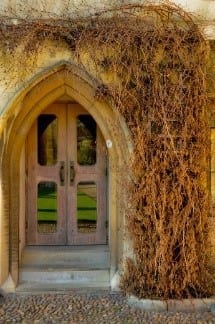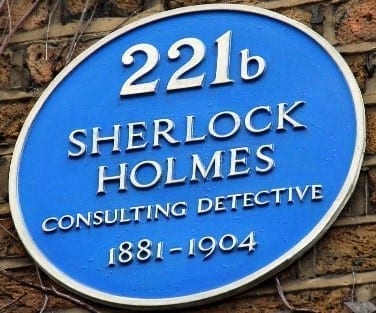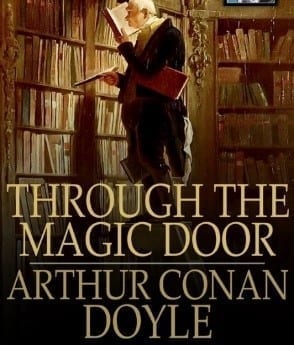“Father said it used to be a gentleman was known by his books.” —William Faulkner, The Sound and the Fury

You are invited, gentle reader, to walk through the magic door and step into the library. Smoking is allowed, says your host, as he invites you to sit on the green settee from “where you can see the old oak case with its untidy lines of volumes.” You face the books and he will introduce you to the “great dead.” He shows you his volumes, many frayed and worn, his constant companions ever since he bought them at bookstores in Edinburgh, each representing a sacrifice, a lunch, for they were acquired during his none too affluent student days.
Your host will tell you that he studied medicine at the University of Edinburgh. There he was one of the brightest students of Joseph Bell, the famous physician and surgeon from whom he learned the art of observation and deduction that served him well in his writing days. In his youth he had tried his hand at various medical activities and practices, but not for long and not too successfully. He went on whaler to Greenland. He even went to Vienna to become an eye doctor but had trouble understanding German. So, he became instead a successful writer of detective stories, inventing the immortal Sherlock Holmes who lived at 221b Baker Street and was modeled after Joe Bell.
But now in his library you will find an unexpected facet of your host. He is literati; has delved deeply into English, American, and French authors; has strong opinions about them; and appreciates having a good library. This he calls a magic place, and in 1912 published a small book, Through the Magic Door, in which he invites the reader to leave behind the cares of the day and enjoy the company of the great minds of the past. He begins as follows:
Close the door of the room behind you, shut off with it all the cares of the outer world, plunge back into the soothing company of the great dead, and then you are through the magic portal into that fair land wither worry and vexation can follow you no more. You have left all that is vulgar and all that is sordid behind you. There stand your noble, silent comrades, waiting in their ranks. Pass your eyes down the files. Choose your man. And then you have but to hold up your hand to him and away you go together into dreamland.

He invites his guest still sitting on the green settee to go from book to book as he talks about the works of Lord Macauley, Sir Walter Scott, and William Shakespeare. He discusses the great poets, the early English novelists Fielding, Richardson, Smollett; and he has much to say about Thomas Carlyle, Sir Walter Scott, Guy de Maupassant, Froissart, Herman Melville, Charles Lamb, and George Meredith. He is realistic about their qualities and faults. He admires Edward Gibbon of the Decline and Fall of the Roman Empire but writes that he was inclined to excessive drinking which gave him the gout, and was “a cold-blooded man whose brain seems to have grown at the expense of his heart,” who abandoned his girl at the order of his father, “obeying as a son and sighing as a lover” but with tears neither profuse nor long-lasting. Samuel Pepys, he thinks, must have been a man of considerable attainments to make himself seem so insignificant; Balzac a very strange man, bigoted, prejudiced, obstinate, inclined to be sulky; Kipling a great master of comprehension and dramatic sense, suddenly glowing into a vivid flame; Edgar Allan Poe the world’s supreme short story master, and Guy de Maupassant a close second, clear, fine, and sensitive. Of Oliver Wendell Holmes he writes that “never have so I known and loved a man whom I had never seen.” Robert Louis Stevenson is at his best when most natural and not conscious of his style like a man who conceals his natural curls under a wig. Dr. Samuel Johnson, the great conversationalist, would hardly have been the read even in his time were it not for James Boswell, the greatest biographer of all times. Yet Boswell was treated unfairly by Macauley, who derisively claimed he was able to write the work that made him immortal only because he was “a dunce, a parasite and a coxcomb.”

And so we leave our host in his magic place to reflect that even in this age there may be still a role for a library, a place to browse, to pick up a book and handle it, turn its pages, and enjoy its contents. Libraries have a long history, but a liking for them must be acquired in one’s youth, to develop, as Oliver Wendell Holmes put it, a liking for the smell of old leather. The ancient Egyptians were the first to build state libraries; the Ptolemies built the famous library of Alexandria that Julius Caesar burned down; prominent Romans all had sumptuous libraries; and much later Michel de Montaigne retired into his circular library to enjoy his books and write his “essais” or attempts. Libraries have long been a place for contemplation and creativity, also for escape, such as for Mr. Elliott of Pride and Prejudice to get away from the silliness of his wife and daughters. Above all, a library remains a place of magic, as for Sir Arthur Conan Doyle, “a fair land wither worry and vexation can follow you no more, and where you have left all that is vulgar and all that is sordid behind you.”

Leave a Reply